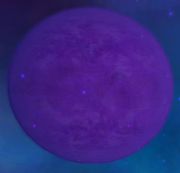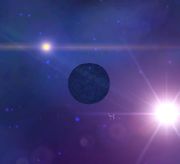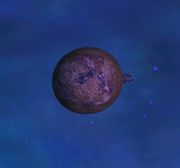Article possibly outdated (v4.86
)This article has not been verified to be up to date for the latest version of the Discovery mod. The last edit was made on 17.12.2012 (
DD/MM/YYYY). You may help by
updating it, often by using the
code generator.
Little is known about this Guard system. The Golden Chrysanthemum Guard protects this system from enemy incursions with deadly force. However, trespassers aren't killed on sight if they haven't been for longer than five minutes in the system. They may choose whether they turn back and pay a fine of five million, or be destroyed. The entry points into this system is not known on any lawful database, and only the Golden Chrysanthemum members know actually where this system is. The location of this system is on a need to know basis, it is usually considered Top Secret information. Rumors persist of a ancient Mine field in the system, as well as a Neutron star.
System Overview
|
Astronomical Bodies
Stellar Objects
- Medium White Sun
- Blue Dwarf Sun
- Planet Kushiro
- Planet Hiura
- Ekitei X-Ray Pulsar
- Planet Kitahara
- Takkinai Cloud
- Goyomai Debris Field
- Hachiman Ice Field
- Ishijima Asteroid Field
- Nishiara Asteroid Field
|
Industrial Development
|
Faction Presence
Lawful Factions
Corporations & Guilds
Unlawful Factions
|
Jump Gates and Holes
Planetary Bodies
Planet Kushiro
- Planet Kushiro was surveyed in early 656 A.S. by the Golden Chrysanthemum scouts that were sent into Tau-65 to chart the system and list its suitability for secret installations. Deep scans revealed that the planetary composition is roughly 74% Hydrogen, 22% Helium and 4% of various other elements. Despite the large quantities of Hydrogen and Helium, no mining operations of any kind have as yet taken place to extract these valuable resources from Kushiro's atmosphere.
- Location: H/5
- Diameter: 26,789 km
- Mass: 12.44 x 10e24 kg
- Terrain: N/A
- Temperature: N/A
- Escape Velocity: 20.08 km/sec
|
|
Planet Hiura
- Surveyed in late 655 A.S., Hiura is a small rocky moon covered in a deep layer of ice. Despite its relatively small size, deep scans have revealed the moon to be primarily composed of silicate rock with a dense iron core. The resulting mass has enabled Hiura to retain a thin atmosphere composed mainly of oxygen, although it is still not breathable by humans. Several probes have examined the moon in greater detail over the years, but a lack of any appreciable resources has precluded any mining development.
In addition to a thin atmosphere Hiura also sports several rings, composed mainly of dust particles and ice crystals. At certain periods during its orbit of the stars, the light from both stars catch the rings at such an angle that the rings shimmer in every colour of the light spectrum. If it weren't for the highly secretive nature of the system and presence of the Golden Chrysanthemums, Hiura would likely be a popular tourist destination. Even so, many within the Blood Dragons and the Golden Chrysanthemums visit the nearby Morioka base to catch a glimpse of the spectacular view that the planetoid offers.
- Location: C/6
- Diameter: 4,482 km
- Mass: 3.15 x 10e24 kg
- Terrain: Ice
- Temperature: -76°C to -57°C C
- Escape Velocity: 20.08 km/sec
|
|
Ekitei X-Ray Pulsar
- The X-ray Pulsar is officially classified as X-384 by scientists and interstellar navigation organisations, but most Golden Chrysanthemums simply refer to it by the name Ekitei. Ekitei releases periodic bursts of X-ray radiation, which can last from a fraction of a second up to several minutes between bursts. The pulses also tend to be directional, and any unshielded life forms would instantly die if exposed to an X-ray burst.
- Location: G/3
|
|
Planet Kitahara
- Originally charted in 655 A.S. by the Golden Chrysanthemum exploration vessel Hikki Maru, the planet Kitahara was noted for its extreme similarities to Malta, even down to a virtually identical climate and atmospheric composition. Fully habitable with a comfortable surface pressure and an atmosphere that is well within the tolerable limits for human respiration, the planet was eventually settled by large numbers of the Sisterhood and their families in 678 A.S., with farms and homesteads becoming commonplace across the planet after only a few years.
Substantial deposits of iron, aluminium and niobium were discovered in the Okimura mountain range on the northern continent by several Blood Dragon planetologists, although it was not until 723 A.S. that mines were opened to take advantage of the availability of these resources. Initially the work was done by robotic mining machinery and human overseers, but as more prisoners were captured during fights against the Kusari Naval Forces, Farmers Alliance and the Hogosha, they started to be put to work within the mines. Captured female prisoners were either inducted into the Golden Chrysanthemums if suitable or sold off to the Outcasts and Blood Dragons in exchange for Cardamine and supplies.
By 766 A.S., the planetary population was estimated to have reached at least twelve thousand. The majority of the inhabitants were still members of the Sisterhood, but a significant number were also Blood Dragons by now, who had relocated from Kyoto Base to a more pleasant planetary environment after having grown weary of living in space. The Blue Lotus Syndicate even constructed a number of offices and warehouses within the capital city of Yomi, to serve as a base to which to ship Cardamine to the Golden Chrysanthemums, all the way from Malta.
In 805 A.S., after a convention held in Yomi by many eminent Golden Chrysanthemum and Outcast scientists, it was decided to attempt to seed Kitahara with Cardamine. The planetary conditions were largely ideal and very similar in many ways to Malta itself, so it was widely believed that Cardamine could indeed be grown on Kitahara. Experimental plantations were set up the following year, but unfortunately most of the seeded Cardamine initially died out due to inexperience by Sisterhood farmers in cultivating the grasses. By 809 A.S., the Cardamine did manage to take hold in a few areas, but the yields were of horrendously poor quality compared to the Cardamine from Malta, but there was a severe side-effect to the meddling in the planet's ecosystem. The influence of the Maltese orange grass on Kitahara's ecology had begun killing off almost all other native and important crops and with the planetary population in excess of thirty thousand, starvation was looking to be a serious prospect. Many Blood Dragons also became appalled at the Cardamine experiments occurring on the planet and began moving off-world once more, most returning to Kyoto Base, while others moved to the Ryuku and Mito bases.
To counter the potential starvation issues, the Golden Chrysanthemums have since embarked on the ambitious Chanai Biodome Project, covertly aided by Synth Foods, Inc, while at the same time continuing the Cardamine experiments on Kitahara with the Blue Lotus Syndicate. The Cardamine experiments have drawn considerable interest and outrage on Malta, with many Outcast Dons arguing amongst themselves on the viability and threat of such an undertaking. Some argue that it provides the Outcast people with a fallback safety net should Malta ever be nuked by the Corsairs, while others feel that it undermines their ability to effectively control the entire Cardamine market within the Sirius sector. Nevertheless the Blue Lotus Syndicate, an influential Outcast organisation by its own merits, maintains its support of the venture and has a sizeable presence on the planet.
- Location: G/6
- Diameter: 13,512 km
- Mass: 6.20 x 10e24 kg
- Terrain: Terrestrial
- Temperature: -22°C to 32°C
- Escape Velocity: 12.60 km/sec
|
|
Nebula and Asteroids
Takkinai Cloud
- The Takkinai Cloud is beautiful mass of multiple inert gases, but despite the visual aesthetics of the cloud it remains a dangerous area to enter. Sensor efficiency is reduced to almost nothing and there are rumours of a dangerous minefield near the centre of the nebula, although what it defends is anyone's guess.
- Location: E/5
|
|
Goyomai Debris Field
- This debris field is all that remains of the Goyomai Outpost, destroyed by the Farmers Alliance in a large attack on the Tau-65 system in early 817 A.S.
- Location: B/2
|
|
Hachiman Ice Field
- The Hachiman ice field has long been a source of water for the Golden Chrysanthemums and a number of small mining machines are scattered throughout the ice fields collecting water to bring back to Morioka base, where it is purified into a drinkable form.
- Location: B/5
|
|
Ishijima Asteroid Field
- An asteroid field with no appreciable resources, although it has a small measure of scientific interest as it is believed that the field may be the remnants of a large asteroid or small planetoid that got too close to one of the stars and broke up.
- Location: D/2
|
|
Nishiara Asteroid Field
- The Nishiara asteroid field is believed to have once been a planet that collided with the X-ray Pulsar at the heart of the field. The asteroids contain reasonable quantities of plutonium, niobium and iron, but due to the extremely high levels of radiation pouring from the X-ray Pulsar it is far too difficult and dangerous for anyone to extract the materials. The heavily shielded Kawada Research Complex lies within the field, and fortunately the area lying in the "shadow" of the base remains largely radiation free, thanks to the shielding provided by the station.
Due to the strength of the bursts, it is highly recommended for all vessels to avoid the Nishiara Asteroid Field at all costs, and numerous wrecks lie within the field as a testament to those who did not heed the warning buoys.
- Location: G/4
|
|
Space Stations
- Constructed in 654 A.S., five years after the completion of Ainu Depot in Hokkaido, Morioka Base was designed to house many of the dependents of the Golden Chrysanthemums. Initially just a collection of space habitats welded together, eventually it was formalised into a proper station with docking ports, repair bays and active defences. Most of the Sisterhood took breaks from the frontlines at Morioka in the past, although these days many of them prefer to relax on Chanai instead, helping out in their spare time with the Biodome projects.
- Location: C/6
- Class: Sappho
- Gravity: Complete
- Docking: Yes
- Amenities: Yes
- Population: 120
|
|
- The Takada Shipyard building project began in 713 A.S., using the stolen blueprints of Yokohama Shipyard, although due to financial and material shortages it was never finished until 725 A.S. Built in orbit of the planet Kitahara, the shipyard was designed to handle the testing of finalised prototype ships designs and construction of actual ships for use by the Golden Chrysanthemums and their allies. Several designs for heavy fighters were tested here, although most were eventually scrapped, due to being unable to compete with existing fighters constructed by the Kusari Naval Forces.
- Location: G/6
- Class: Koyama
- Gravity: Complete
- Docking: Yes
- Amenities: Yes
- Population: 2K
|
|
- Kawada Research Complex was built in 791 A.S., in conjunction with Blood Dragon engineers, primarily to study the Ekitei X-Ray Pulsar, but also as a secluded location where work on new weapons and ship testing could proceed away from prying eyes. Despite being completed with the help of the Blood Dragons, the majority of the staff is female, although there are nevertheless a number of Blood Dragon technicians remaining onboard.
- Location: F/3
- Class: Hedonai
- Gravity: Complete
- Docking: Yes
- Amenities: Yes
- Population: 800
|
|
- The Chanai biodome project is often regarded by many within the Golden Chrysanthemums to be of critical importance to their organisation, providing the vast majority of the necessary food supplies to the growing Sisterhood population, in addition to the schools and nurseries for the young children.
- Location: C/1
- Class: Ishikari
- Gravity: Complete
- Docking: Yes
- Amenities: Yes
- Population: 12K
|
|
Mineable Commodities
- Dihydrogen monoxide (H2O) is odorless, tasteless, transparent, and absolutely essential to human life. Roughly 75% of the human body is composed of Water. Deprived of Water, most humans can only live three days. The process of dehydration is a painful one, as tissues shrivel and vessels shrink in a desperate bid by the dying body to preserve its remaining vital functions.
- Location: B/5
|
Error creating thumbnail: Unable to save thumbnail to destination |
- The rapid industrialization that followed the settlement of the Sirius Sector has resulted in large fields of Scrap Metal, the detritus resulting from extensive manufacturing and mining operations. These debris fields present both a navigational hazard and a potential second-stage resource, so a small cottage industry has sprung up among those who collect scrap metal and resell it at smelting plants.
- Location: B/2
|
Error creating thumbnail: Unable to save thumbnail to destination |



